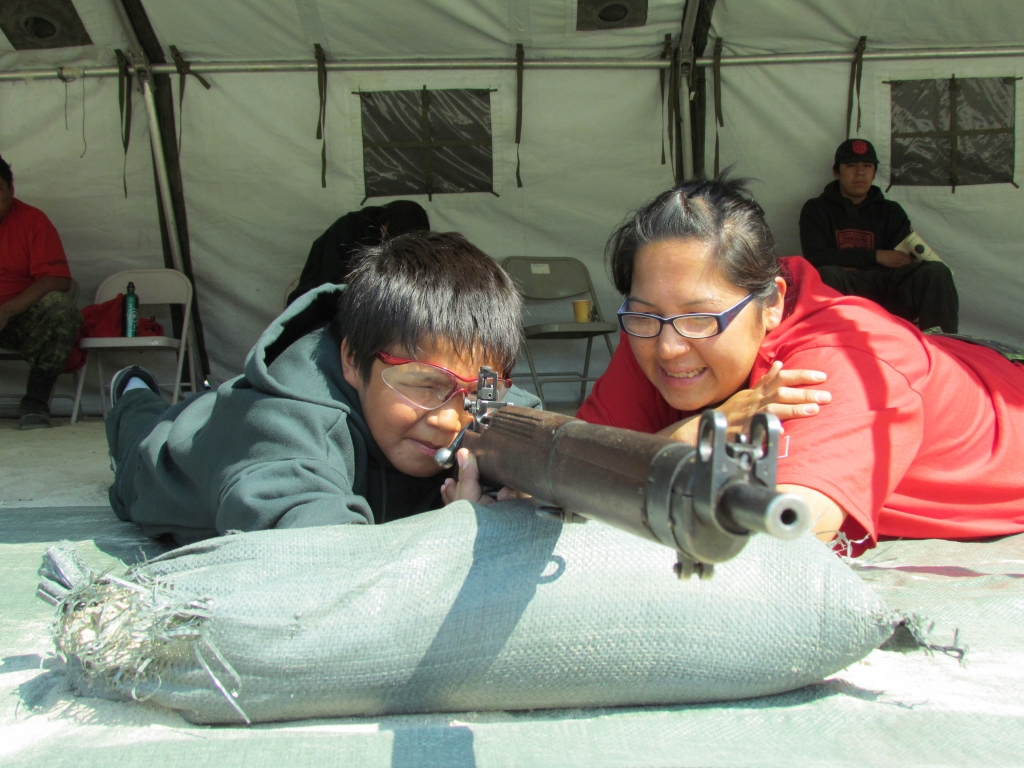Camp Loon was “an excellent camp this year,” according to the officer commanding the 700 Junior Canadian Rangers across northern Ontario.
“It went very well,” said Captain Caryl Fletcher. “There were a lot of Junior Canadian Rangers who were first-timers at the camp. So it was a new experience for them and we also had a lot of younger Junior Rangers this year, aged 12 to 14. They were just thrilled to be here.”
The annual camp, held on Springwater Lake, 50 kilometres north of Geraldton, provided eight days of advanced training for 148 Junior Rangers from 19 First Nation communities.
Instruction included shooting (both rifle and paintball), boating (power boats and canoes), driving all-terrain vehicles, instruction in how to swim-to-survive, mountain biking, and traditional arts and crafts and skills, including drumming. A highlight of the program was a 130-metre zipline that was launched from a 10-metre tower and crossed a river. The zipline was hugely popular and some Junior Rangers did as many as 14 trips on it.
Junior Canadian Rangers are part of a national youth program run by the Canadian Forces for boys and girls aged 12 to 18 in Canada’s remote and isolated regions.
The program at Camp Loon emphasized safety on the land and water and in personal lifestyles and was delivered by 46 Canadian Rangers and 52 other military personnel. Canadian Rangers are part-time reserve soldiers. In northern Ontario, there are 550 Rangers in 23 first nations.
“Our number one focus is fun and right behind that is safety,” Captain Fletcher said. “A lot of what we teach they take back to their communities and they use it. We teach them how to use all-terrain vehicles, power boats, canoes, and about water safety. I know they remember what we teach them and many of them will pass it on to their friends. I’ve seen Junior Rangers in northern communities ask someone getting into a boat where their life jacket was. And they ask because we’ve taught them about the importance of wearing a life jacket.”
The Canadian Rangers have 50 life jackets and 50 helmets, suitable for both ATV and snowmobiles, in each of 20 remote northern Ontario first nations for community use. They may be borrowed by anyone who wants to use them.
A highlight of this year’s camp, as always, was the food prepared for the Junior Rangers by a military field kitchen. “The food was great,” said Junior Ranger Preston Cromarty, 14, of Kitchenuhmaykoosib. “It was healthy and it tasted good.”
“The whole menu was designed for the children,” said Leading Seaman Karen Boot, one of six cooks at the camp. “That’s why there was hot dogs, burgers, and pizza subs. That’s what they wanted. They can’t get that in their communities. So, instead of roast beef for dinner, we gave them what they wanted. We had lots of healthy food for them.
“Did they appreciate it? Yes, they did. They said so. One night four of them came and said good night to me before I went to bed. They walked by my tent and they said: ‘Goodnight, cook. See you later, Boot.’ That was their way of saying thank you.”
(Sergeant Peter Moon is the public affairs ranger for 3rd Canadian Ranger Patrol Group at Canadian Forces Base Borden.)
As we are ready to honour November 11, Remembrance Day I think about the destruction war has done to my James Bay Cree family and my partner Mike’s










As we are ready to honour November 11, Remembrance Day I think about the destruction war has done to my James Bay Cree family and my partner Mike’s Irish...
Gold has arrived. Here in the north of Ontario we see vast streams of gold shimmering across the landscape as autumn is here and the the leaves are turning...